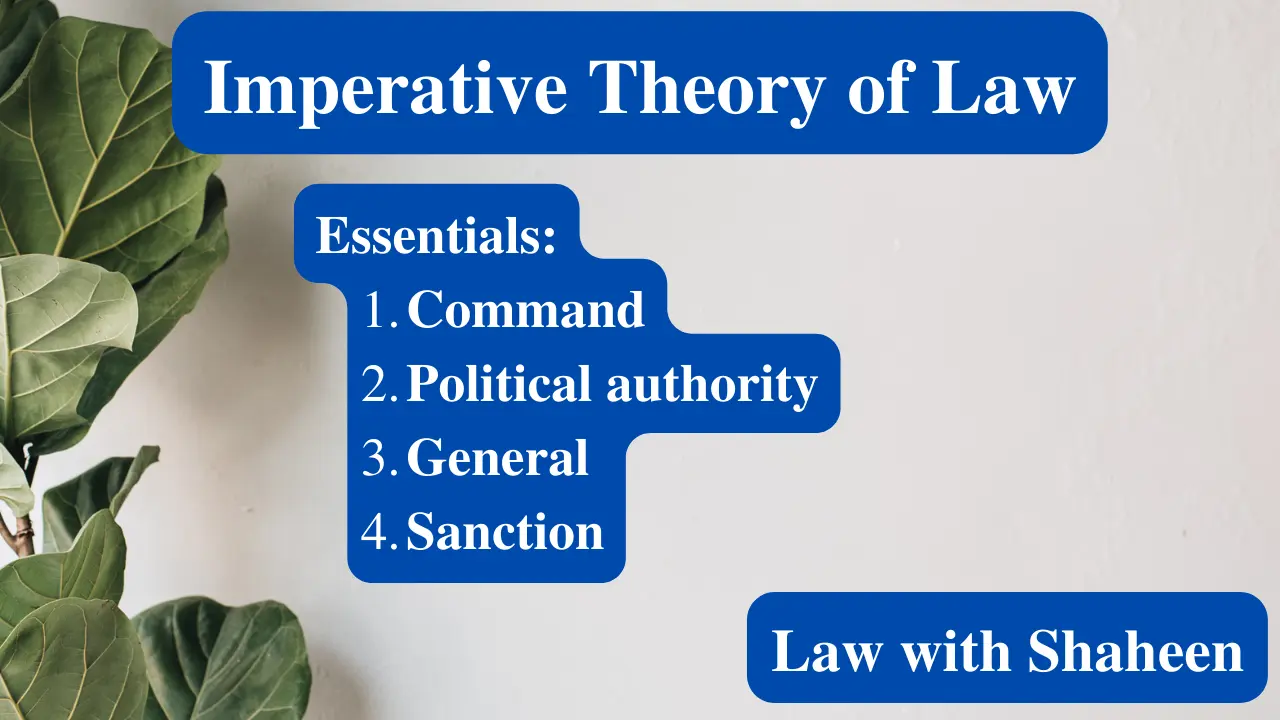Table of Contents
Introduction to Imperative Theory of Law:
Hobbes, a philosopher of the 17th century, A.D., was the founder of the theory that man is by nature a selfish animal. He is not a social animal and finds nothing but grief in the company of his fellow human beings and lives in continual fear of danger and violent death. This state of affairs drove him to the necessity of joining some authority however despotic it might be.
So, from this Hobbes concluded that Law originated neither in custom nor in consent but in the will and power of a superior. It is attributed to John Austin due to whom It gained recognition and popularity. Now this theory is referred to as the Austanian Theory.
It is also known as positivist theory, the theory of imperative law, and sometimes it is known as “The law as a command of Sovereign”.
Definition of Law:
According to Austin;
“Law is a command which obliges person or persons to a course of conduct”.
In simple parlance, Laws are commands issued by the political superior or sovereign for the observance of the subjects and are enforced by sanction of the physical force of the State.
Essentials of Law:
According to Austin, there are four essentials of Law:
1. Command:
It is an expression of a wish by one person(sovereign) that another(subjects) should do or forebear from a specified act. It must be general and not particular.
2. Political Authority:
Austin says the law is a set of rules in a system organized by sovereign authority over a distinct territory under its hegemony. Laws are commands enforced by a sovereign authority that are expressions of his desire.
3. General:
The law must be general and not particular. As Blackstone says, where a command obliges persons individually, it is not a law.
4. Sanction:
The idea of command must indicate the existence of sanction behind it. Law is to be obeyed by subjects whether they wish to obey it or not. The disobedience of the law would result in punishment which is the sanction behind the law. Thus, the law as a command is backed up by sanction.
Criticism of Imperative Theory of Law:
Salmond criticized the imperative theory of the Law of Austin on two grounds:
1. Imperative Theory of Law is One-sided:
Salmond says that Austin recognized only the formal source of law but did not consider its ethical and material sources. The theory implies that law is law because it is enforced by the physical force of the State and not because it is right or just.
2. The Imperative Theory of Law is incomplete:
All laws are not always imperative or commands. Many rules do not raise any obligations but merely give rise to liberties and powers, such as contract law, etc.
Henry Maine, the main exponent of the historical school, has criticized Austin’s imperative theory of law on two grounds:
1. Law is not always linked with a sovereign:
In early communities, rules which regulated life were derived from immemorial usages and these rules were administered by domestic tribunals in families or village communities.
So, Austin’s insistence on sovereignty as an essential prerequisite of law carries no weight. There are rules of customary law, international law, and even constitutional law in England that are habitually obeyed and yet they do not fall within the Austinian definition of law.
2. Sanction which is advocated by Austin for the law is an essential element of criminal law but there is nothing like sanction in the case of civil law. So, the whole of civil law will be excluded from the sphere of positive law.
To conclude despite criticism of Austin’s theory of law, it cannot be derived that Austin rendered a great service by giving a clear and simple definition of law. But it is admitted today this is one legal theory that is very close to reality.
According to Austin, “Every positive law or every law simply and strictly so called, is set by a sovereign individual or sovereign body of individuals to a person or person in a state of subjection to its author”.
